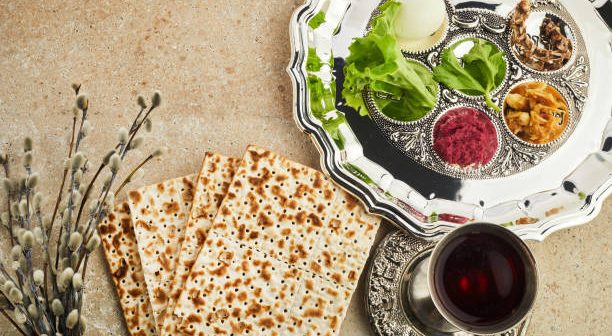As families gather around beautifully laid tables this week, the air fills with the aromas of traditional dishes, and the voices of generations rise together in prayer and storytelling. Passover—Pesach in Hebrew—has arrived, and with it comes a time of remembrance, reverence, and resilience. Forever News extends heartfelt greetings to our Jewish readers across the world and in India: Chag Pesach Sameach! May your festival be filled with freedom, faith, and cherished moments.
Passover, one of Judaism’s most sacred festivals, commemorates the liberation of the Israelites from slavery in ancient Egypt over 3,000 years ago. According to the Torah, God delivered ten plagues upon Egypt to persuade Pharaoh to release the Israelites. The final plague—the death of every Egyptian firstborn—prompted Pharaoh to relent. The name “Passover” originates from this plague, during which God “passed over” the homes of the Israelites who had marked their doorposts, sparing their children and securing their escape.
The holiday begins on the 15th day of the Hebrew month of Nisan, usually falling in March or April, and is observed for seven days in Israel and eight days in many Jewish communities elsewhere. In all these days, the focus is on the Exodus and the spiritual rebirth that came with freedom.
A core tradition of Passover is the avoidance of chametz, or leavened bread, which symbolizes both physical and spiritual puffery. As a result, Jewish households undergo a meticulous cleaning process beforehand, removing all traces of leavened food. In its place, matzah—an unleavened flatbread—is eaten to recall the haste with which the Israelites fled Egypt, not having time for their bread to rise.
The ceremonial centerpiece of Passover is the seder, held on the first two nights. Families read the Haggadah, a text that tells the Exodus story, and partake in symbolic foods arranged on a seder plate. Each item—be it the bitter herbs, the charoset, the shank bone, or the egg—holds deep meaning tied to suffering, hope, and redemption. Children play a vital role in the seder, asking the Four Questions and engaging with the story, ensuring that memory and identity are passed lovingly through generations.
In India, though the Jewish population is small, the celebration of Passover is rich with unique heritage. Communities such as the Bene Israel in Maharashtra, the Baghdadi Jews in Kolkata, and the Cochin Jews in Kerala maintain vibrant customs that blend ancient Jewish ritual with local Indian flavor. Passover preparations begin weeks in advance. Homes are swept clean of chametz, and special kosher-for-Passover utensils and cookware are brought out. Matzah is either imported or baked fresh within the community. Indian-Jewish dishes like coconut-based charoset, spiced egg curries without leaven, and local fish stews seasoned to comply with holiday restrictions, adorn the seder table.
In Mumbai, synagogues like the Knesset Eliyahoo and the Magen David host community seders where dozens of families, elders, and young children gather under one roof. In Kochi, the remaining Cochin Jews uphold centuries-old practices passed down with care. Though the numbers have dwindled over the decades, the spirit of Passover remains as strong as ever in Indian Jewish households.
Passover is not only a commemoration of ancient history but also a timeless lesson. It speaks of injustice overcome, of identity preserved through adversity, and of the enduring relationship between a people and their faith. It is a story of survival—and of hope that transcends all borders.
To our Jewish readers, whether you are celebrating in a small family circle in Pune or hosting a large seder in New York, Forever News stands with you in honoring this beautiful festival. May your matzah be crisp, your stories inspiring, and your hearts full. From all of us: Happy Passover! Chag Pesach Sameach!





